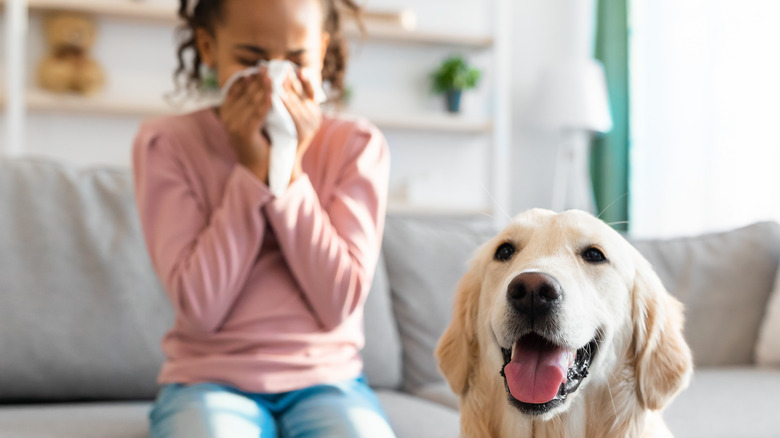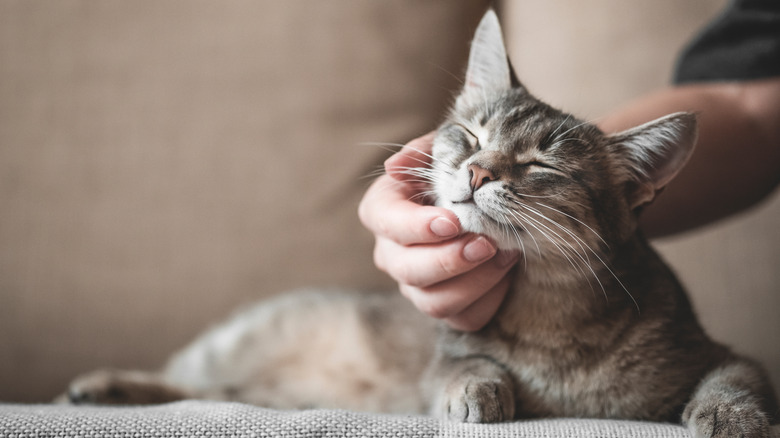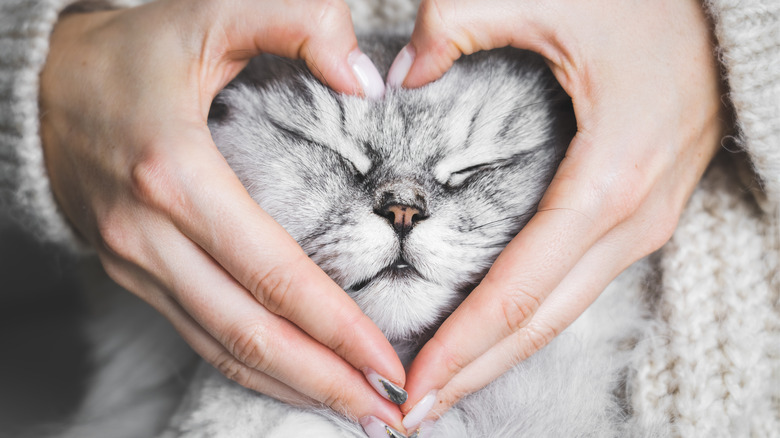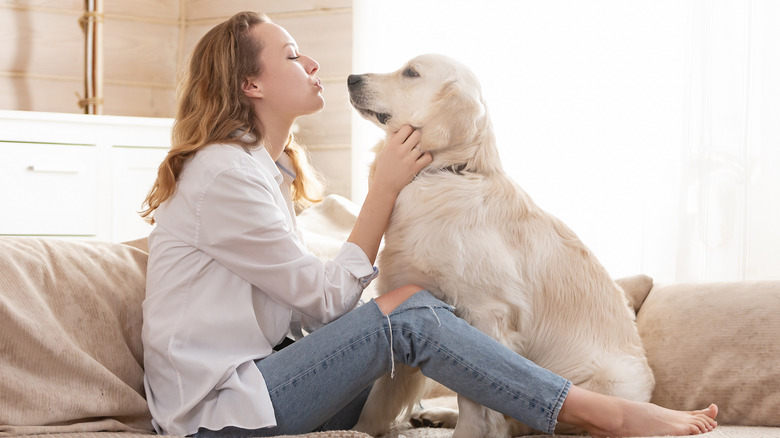The Real Effects Owning A Pet Has On Your Body
If you've ever had a pet in your life, then there's a good chance you'll agree with the sentiment that pets are the perfect best friend. They listen to all of your problems and are there to support you, with no complaints. They are loving, cute, cuddly, and always excited to see you (well, with the exception of some cats).
Many domesticated animals bring us joy. Thus, it's no wonder that they are commonly deemed as emotional support animals and used for therapy. 62% of Americans have had at least one pet in their home, and 91% think of their pet as a family member, reported The Harris Poll in 2011. The pandemic has increased the number of pet owners in the U.S. to 70% (via the American Pet Products Association). This isn't really surprising, though; if you have to spend more time at home, you might as well have a cuddly companion to share it with!
Interestingly, a majority of pet parents believe that their pets listen to them more than their spouse or friends, according to a 2004 pet owner survey by the American Animal Hospital Association. In fact, most of those surveyed would even risk their own life for their pet. However, having a furry friend around can bring more than just a smile to your face — some of the effects owning a pet has on your body and brain might even surprise you.
Pets can decrease your stress levels
Scientific research shows that being around animals, and even just petting a furry friend, lowers your cortisol. Your adrenal glands release cortisol, the stress hormone, when your body feels stressed. Persistently high levels can cause weight gain, a weakened immune system, and other health issues (via John Hopkins Medicine). Pets can also increase your levels of serotonin and dopamine, which help promote feelings of peace and relaxation (via HelpGuide).
As a matter of fact, some universities have started programs called "Pet Your Stress Away," a place students can visit cats and dogs to help relieve the stress of college. A scientific study of the students participating in one of these programs found that even just 10 minutes of hands-on interaction with the animals showed a significant reduction of cortisol (via Science Daily). This study suggests that you don't need to be a pet parent to receive the stress-relieving benefits of one. The next time you're feeling stressed, you could offer to walk your friend's dog, cat-sit for a weekend, or even just simply spend an afternoon in a nearby dog park.
Pets can actually improve your allergies
You read that right. Some people are allergic to cats or dogs, but that might be because they didn't grow up with pets. According to the Asthma and Allergy Foundation of America, 10-20% of the population is allergic to cats and dogs. However, one scientific study has found that infants who lived in a home with a dog had less of a risk of developing allergies, as well as eczema. "The old thinking was that if your family had a pet, the children were more likely to become allergic to the pet. And if you came from an allergy-prone family, pets should be avoided," says head researcher Dr. James E. Gern (via WebMD). But new research is showing that may not be the case.
So how does it work? Allergies occur when your immune system is reacting to something it shouldn't. Microorganisms exist almost everywhere, even on pets — especially if they go outside. Pets don't wear shoes and lick questionable surfaces. They bring these germs into your home. When babies are exposed to said germs, especially during the first three months of their life, it helps build their immune system, meaning that it won't react to allergies as often later in life (via the New York Times).
Pets can boost your immune system
Not only are pets good for your brain, but they're good for your body, too. Research data (via Psychological Reports) suggests that petting animals can also increase your immunity by boosting your immune antibodies.
A study published in the Journal of Allergy and Clinical Immunology also showed that infants with a dog in the home had higher levels of immune system chemicals. And it doesn't just stop at dogs: A different study (via the New England Journal of Medicine) showed that children growing up around farm animals had an increased innate immune response, as well as decreased allergies and asthma.
But perhaps the most notable way animals help boost the immune system is by providing stress relief. Chronic stress has been proven to reduce our immune system function. Stress also increases the likeliness of unhealthy lifestyle choices that can help you get through it, but may negatively affect the immune system, like drinking alcohol, eating junk food, or smoking (via Simply Psychology).
Pets help you exercise more
Nothing works better to get you out of bed and go on a walk like a guilt-trip from those puppy dog eyes. It makes sense: Sometimes, it can be challenging to find the motivation to go out, but when your dog is relying on you, there is more of an incentive.
Research suggests that people with dogs are far more likely to meet their workout goals than those without pets. Taking your dog on a walk, hike, or run is good for both you and your dog — it helps deepen your animal-human bond, helps your pet stay healthy, and it can balance out any behavioral issues when they get enough physical activity (via HelpGuide).
In addition, a research paper in the Journal of Epidemiology and Community Health found that people with dogs lived a more active lifestyle compared to those who didn't. Unfortunately, these stats only really apply to dog parents (unless you happen to have a cat that enjoys going on walks with a leash).
Pets can make you feel less lonely
Since the start of the pandemic, social distancing has been the new norm. But creating space between you and your loved ones can be pretty isolating. According to the American Society for the Prevention of Cruelty to Animals, more than 23 million Americans got a pet during the pandemic.
Not only does the companionship of your pet help you feel less lonely, but the fact that dogs help you get outside more means that you will be out in parks, on sidewalks, and in other areas interacting with the public. And as any owner of a cute pet can attest, our little furfriends tend to draw attention. If you own a dog, think about this: How many times has a stranger asked you how old your dog is, or what their breed and name is?
One survey reports that 54% of people polled think their pet helps them connect with other people (via Mars Petcare). A majority of those surveyed said that their pet helps them feel less shy, and a surprising 90% of those over the age of 55 think that pets can help older adults feel less lonely.
Pet owners are less likely to have depression
It's no doubt that pets bring happiness to people. Scientific studies have shown that those with pets are less likely to struggle with depression (via HelpGuide).
One particular study reported that pet owners were about 41% less depressed than people who didn't own pets. Those who suffer from depression report that their pets offer them unconditional love, which can be very consoling, especially if you feel isolated. Some also share that their pets help them feel like they have a purpose, with can ease feelings of worthlessness that often accompany depression (via WebMD).
Furthermore, "animals pick up on when their owners are distressed," states clinical psychologist Perpetua Neo, PhD. "When they sense you're not feeling well, they offer comfort" (via WebMD). This lines up with the results of a pet owner survey by the American Animal Hospital Association, in which 64% of people believed that their pet would come to their rescue if they showed signs of suffering.
If you or someone you know needs help with mental health, please contact the Crisis Text Line by texting HOME to 741741, call the National Alliance on Mental Illness helpline at 1-800-950-NAMI (6264), or visit the National Institute of Mental Health website.
Pets can help lower your blood pressure
Pets are good for your heart — metaphorically and literally. When feeling stressed, people with pets have lower blood pressure than those without them. According to data collected from a study (via Psychosomatic Medicine), not only did pet people have a lower blood pressure, but they also had a decreased base heart rate, in addition to a faster recovery time after a stressful situation. In fact, a different study found that people with hypertension had remarkably lower blood pressure within just five months of adopting a dog (via HelpGuide).
Chronically high blood pressure can lead to blood vessel damage, which results in clogged arteries, making your circulatory system work harder and become less effective. Over time, this leaves you more vulnerable to life-altering and life-threatening health concerns (especially if left untreated), including heart attacks, stroke, heart failure, kidney disease, vision loss, sexual dysfunction, angina, and peripheral artery disease (PAD). According to the American Heart Association, "your best protection is knowledge, management, and prevention" — and getting a pet could help, too.
Pets help you recover after a life-threatening event
Pets are always there for you, even when serious health issues arise. Not only do pets help decrease your chances of developing heart disease by lowering your blood pressure, but if you do happen to have a heart attack or stroke, pets can help you recover.
According to one study published in Circulation: Cardiovascular Quality and Outcomes, people with dogs were observed to have better outcomes after a traumatic heart complication. The study found that those with a dog in the home had a lower chance of death after a stoke or heart attack. They also had a lower risk of hospitalization if another serious cardiovascular event occurred. This could be due to the fact that having a dog increases your physical activity, which is important for recovery. It could also be a result of dogs providing impactful psychosocial support, as well as important social interactions, all of which support healing times.
Pets can help improve your body language
Pets have mastered nonverbal communication out of necessity — they can't ask for what they want or need, they must show you through their actions. In fact, there have been scientific studies that examine the different ways dogs and cats have adapted to communicate with humans.
Nonverbal cues and body language are important skills for humans to develop and possess. They can help you in many different situations, like when traveling in a foreign country, communicating with a deaf person, or even picking up on sarcasm or flirting. Humans can improve their nonverbal communication skills by observing their pets and learning from them (via Psychology Today). To work on your nonverbal language around your pets, note the way you carry yourself, as different body postures can convey certain emotions or feelings. Also, observe their body language and actions. In addition, eye contact and facial expressions can be very powerful, and reveal thoughts and emotions (via Harappa Education). There are subtle differences in everyone's body language, human or animal. So be patient, attentive, and persistent, and you will eventually begin to notice and learn how your pet communicates to you.
Pets increase your feel-good hormones
When you pet a cat or dog, you've probably thought, "It must be nice to relax and be petted all day." Well, turns out our animals aren't the only ones benefiting from being petted –- humans get something out of it as well.
According to one study, both owners and their pets showed increased levels of oxytocin when physical interaction like petting took place. Oxytocin is a hormone released by your body that's known as the "love drug" because it strengthens intimacy and bonding (via Harvard Health). Many studies have revealed that oxytocin increases feelings of connection, trust, and kindness in humans (via Medical News Today).
When you pet your furry friend, your body also releases adrenaline and serotonin, which are feel-good hormones and anti-stress chemicals (via Insider). Adrenaline is a hormone that gives you a rush of energy and can make you feel excited (via WebMD), while serotonin is a neurotransmitter that boosts feelings of happiness, contentment, and satisfaction (per the National Center for Biotechnology Information). The combination of all of these chemicals in your brain and body helps explain why we feel so strongly connected to our pets — they encourage love and trust to create a long-lasting bond (via Insider).
Pets may help you sleep better at night
Sure, having a pet crawl all over you at night probably isn't going to give you the most restful sleep. However, recent findings are suggesting the opposite outcome.
One study published in the Mayo Clinic Proceedings found that people were able to maintain undisturbed sleep with their dog in the room (although it did report that a dog in the bed may be a different story). Another recent study found that only 20% of participants thought their pets were troublesome to their sleep, while 41% actually think their pets helped them sleep at night. This may be due to the fact that pets provide companionship, a sense of security, and relaxation — all of which can help you fall fast asleep and stay asleep (via Advanced Sleep Medicine Services, Inc.). This could be why a majority of people let their pets sleep in bed with them at night, according to a Harris Poll.
Pet people have lower cholesterol
Here's one more reason to get a pet: Having one helps lower your cholesterol (via the Medical Journal of Australia) — and multiple studies have backed this up.
Cholesterol is a fat-like material that is in your bloodstream. It is used to create healthy cells in your body, but when there is too much of it, fatty deposits end up in your blood vessels (via the Mayo Clinic). Eventually, they can clog your arteries, decreasing the amount of blood that can flow through them. This can result in serious health issues, like a blood clot, heart attack or stroke.
High cholesterol can be genetic, although it is usually caused by lifestyle habits. Eating healthy and getting regular exercise, like walking the dog, can help decrease your chances of developing high cholesterol. There are no signs or symptoms of high cholesterol, so it is important to get a blood test from your doctor to check if you have it, especially if you are a man over the age of 45 or a woman over 55.
Pets can help decrease pain
Almost 1 in every 5 adult Americans suffer from chronic pain, and an additional 8% experience high-impact chronic pain. If you have persistent pain, it impacts every part of your life, from day-to-day activities to trouble working and difficulty sleeping. Scientific data shows that simply being around dogs can help get your mind off the pain, provide solace, and decrease feelings of seclusion that often come with chronic pain symptoms.
Additionally, a study cited by Physicians Weekly has shown that those with chronic pain who sleep with their pets sharing the bed report "overwhelmingly positive" health benefits from it. Dogs may also help their humans need less pain pills, anti-depressants, and other prescription medications used for chronic pain. In fact, an article published in Anthrozoös found that dramatically less prescription pain medication was required for patients who were involved in the animal-assisted therapy at their healthcare facility.
Pets can help you live longer
Science supports it: People with pets have been observed to have longer lifespans. According to a study published by the American Heart Association, people with dogs have a lower chance of dying from assorted causes than people who don't own a dog. The report looked at studies conducted over the past 70 years, and concluded that people with dogs had a 24% less risk of death by any cause. Those with a history of heart problems experienced an even greater benefit of cohabiting with a dog, with a whopping 65% reduction of mortality risk.
These results may sounds surprising at first, but they actually make sense, given how dogs help us get outside and exercise more, as well as reduce potential health risks associated with problems such as high blood pressure, high cholesterol, poor sleep, and a lowered immune system. Taking care of an animal can be expensive and a lot of work — you may be surprised at how much time you spend getting pet hair off of clothes and couches – but the benefits seem to outweigh the cons. Living a longer, happier, healthier life full of unconditional cuddly love is hard to beat.














